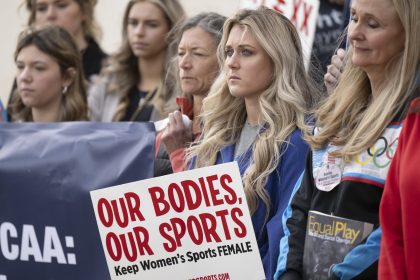Ohio House Passes Two Bills Regarding Transgender Youth

WASHINGTON — The Ohio House of Representatives passed two bills on Wednesday regarding transgender youth, including one barring transgender women from competing in female athletic events.
House Bill 68, known as the Enact Ohio Saving Adolescents from Experimentation Act, and House Bill 8, known as the Parents’ Bill of Rights Act, both passed in votes of 64-28 and 65-29, respectively.
House Bill 68 contains two parts: the Ohio SAFE Act and the Save Women’s Sports Act.
The SAFE Act prevents physicians from performing “gender reassignment surgery on a minor individual” and from prescribing a “cross-sex hormone or puberty-blocking drug” for gender transitioning, according to the bill.
Before a physician treats or diagnoses a gender-related condition under the new bill, they must obtain consent from all acting parents or guardians and screen the patient for physical and mental trauma and comorbidities such as depression and autism.
Republican Rep. Gary Click, the main sponsor of the bill, cited “medical ethics” as the main reason the bill was brought to the table and that puberty blockers are the core of the bill.
“If you look at the World Professional Association for Transgender Health standards of care, they tell us right up front that only 6% of children who have gender dysphoria … will persist after puberty,” Click said.
“However … as soon as you put them on puberty blockers … 98% of those children … will persist into opposite sex hormones and ultimately to surgical interventions,” he added.
The SAFE Act allows physicians to treat patients, including “performing surgery” and “prescribing drugs or hormones,” for physical reasons such as if the patient was “born with a medically verifiable disorder of sex development” or “received a diagnosis of a disorder of sexual development,” according to the bill.
It will also allow physicians to give treatment for side effects caused by gender transition services, even if the service was not done in accordance with state law.
Medicaid would only cover costs for the exemptions to gender transition services and for mental health services for a gender-related condition.
Democratic Rep. Anita Somani, an opponent of the bill, said puberty blockers are used for multiple conditions, and that although multiple groups of people with mental health issues use them, only transgender patients are being discriminated against.
“All three of these populations — precocious puberty, patients who need to increase their height and transgender patients — all use the same drugs,” Somani said. “Puberty blockers are reversible, and this bill would ban the use of puberty blockers only for transgender care.”
The Save Women’s Sports Act bars transgender women from competing in female events hosted by organizations who regulate interscholastic conferences and events, such as the NCAA. It does not restrict participation in male or co-ed events.
It also gives a cause of action to athletes “deprived of an athletic opportunity” and participants “subject to retaliation or other adverse action … as a result of reporting a violation.”
Republican Rep. Jena Powell said allowing biological males to compete with biological females is a discriminatory policy, turning back the clock on the progress Title IX accomplished.
“Title IX was enacted precisely for the purpose of ensuring equal opportunity for women and girls to compete in interscholastic sports,” Powell said. “Discriminatory policies violate Title IX and deny girls educational and athletic opportunities.”
Somani said this part of the bill was a solution looking for a problem, pointing out Ohio has six transgender athletes and organizations already have policies in place.
“Trans women who are on puberty blockers, who are on estrogen, their testosterone levels drop within six months,” Somani said.
“Yes, we all heard about the one trans woman who won the swimming competition, but what we didn’t hear is about the other trans women who competed and lost to cisgender women,” she added.
House Bill 8 — the parents’ rights bill — expands on the existing law requiring school districts to notify parents of sex education to include any instruction about sexuality content. It also allows parents to request their child be excused and take an alternative class.
Along with sexuality content, the bill requires the district to disclose health services offered and allow parents to withdraw consent from any of these services, and prevents district personnel from encouraging students to withhold “information concerning the student’s mental, emotional or physical health or well-being” from their parents.
Rep. Jessica Miranda, a Democrat and minority whip, said the bill restricts teachers’ free speech and lesson flexibility, including talking about LGBTQ+ people and subjects.
“Because of its broad writing, under this bill, a single parent could weaponize this against an educator and stop them from explaining the hard-fought struggle for marriage equality and the freedom to marry who they love,” Miranda said.
Republican Rep. Sara P. Carruthers, one of the primary sponsors of the bill, said the bill was not meant to target any groups, only to inform parents.
“The Parents Bill of Rights, as is, is not anti-LGBTQ+, nor does it have anything to do with LGBTQ+ community,” Carruthers said. “And frankly, it shouldn’t have anything to do with it at all.”
Ohio is the 23rd state to pass bans on transgender athletes, although some state courts have blocked their enforcement at the collegiate level or entirely. House Bill 68 will take effect in six months while House Bill 8 will take effect immediately.
You can reach us at [email protected] and follow us on Facebook and Twitter

























